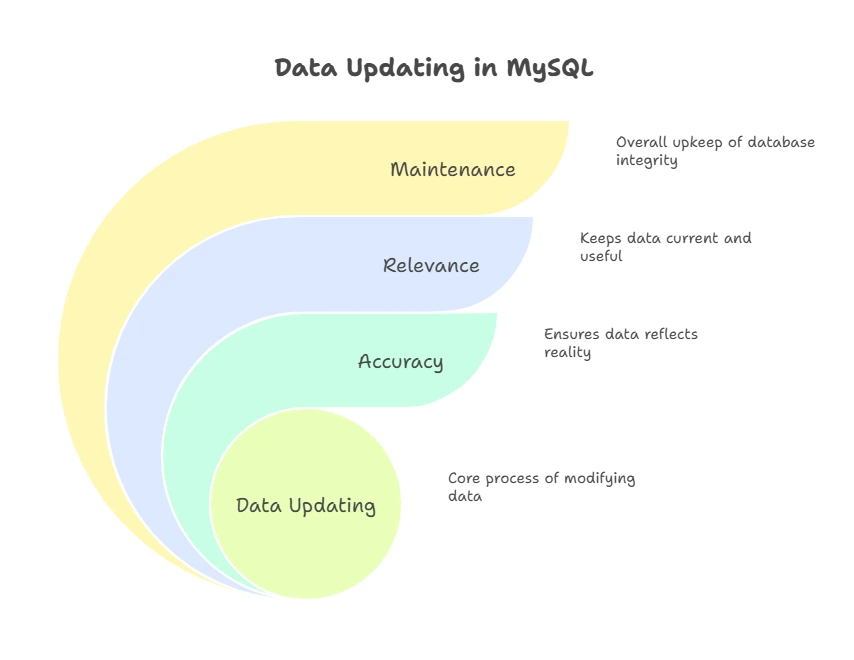Updating Data in MySQL
We'll explore the process of updating data in MySQL databases using Python. Updating data involves modifying existing records in a table based on specified criteria. We'll cover the basics of data updating using the UPDATE statement and then delve into more advanced techniques such as updating multiple records and handling errors.
Introduction to Updating Data
Understanding Data Updating
Updating data in MySQL involves modifying the values of one or more columns in existing records within a table.
Importance of Data Updating
Updating data is essential for maintaining the accuracy and relevance of information stored in the database. It allows us to correct errors, make modifications, and keep data up-to-date.

Basics of Data Updating with UPDATE Statement
Syntax of UPDATE Statement
The UPDATE statement is used to modify existing records in a table based on specified conditions.
UPDATE table_name
SET column1 = value1, column2 = value2, ...
WHERE condition;
Example: Updating Data in a Table
Let’s update the email address of a student with a specific ID in the “students” table.
import mysql.connector
# Connect to MySQL database
conn = mysql.connector.connect(
host="localhost",
user="username",
password="password",
database="mydatabase"
)
# Create a cursor
cursor = conn.cursor()
# Execute UPDATE query
cursor.execute("UPDATE students SET email = 'new_email@example.com' WHERE id = 1")
# Commit changes
conn.commit()
# Close cursor and connection
cursor.close()
conn.close()
Explanation:
- We establish a connection to the MySQL database where the “students” table is located.
- We create a cursor object to execute SQL queries.
- We execute an
UPDATEquery to update the email address of the student with ID 1 to a new value. - The
commit()method is called to permanently apply the changes to the database. - Finally, we close the cursor and connection.
Advanced Data Updating Techniques
Updating Multiple Records
You can update multiple records in a table by specifying a condition that matches multiple rows.
Example: Updating Multiple Records
Let’s update the status of all students with a grade above 90 to “Excellent”.
# Execute UPDATE query for multiple records
cursor.execute("UPDATE students SET status = 'Excellent' WHERE grade > 90")
# Commit changes
conn.commit()
Explanation:
- We execute an
UPDATEquery with a condition that selects all records with a grade above 90. - This updates the status of these students to “Excellent”.
- The changes are then permanently applied to the database using the
commit()method.
Error Handling in Data Updating
Introduction to Error Handling
When performing data updating operations, it’s important to handle potential errors gracefully to prevent unexpected behavior and ensure data integrity.
Error Handling in Python
In Python, we can use try-except blocks to catch and handle exceptions that may occur during data updating operations.
Example: Error Handling in Data Updating
Let’s enhance our previous example with error handling to handle any potential exceptions that may occur during the data updating process.
try:
# Execute UPDATE query
cursor.execute("UPDATE students SET email = 'new_email@example.com' WHERE id = 1")
# Commit changes
conn.commit()
print("Data updated successfully.")
except Exception as e:
# Rollback changes if an error occurs
conn.rollback()
print("Error:", e)
finally:
# Close cursor and connection
cursor.close()
conn.close()
Explanation:
- We use a
try-exceptblock to attempt the data updating operation. - If an exception occurs during the updating process, we roll back the changes using the
rollback()method to maintain data integrity. - Finally, we close the cursor and connection.
We've explored the basics and advanced techniques of updating data in MySQL databases using Python. We learned how to use the UPDATE statement to modify existing records in a table and how to update multiple records based on specified criteria. Understanding how to update data effectively is crucial for maintaining data accuracy and relevance in MySQL databases. Happy Coding!❤️
